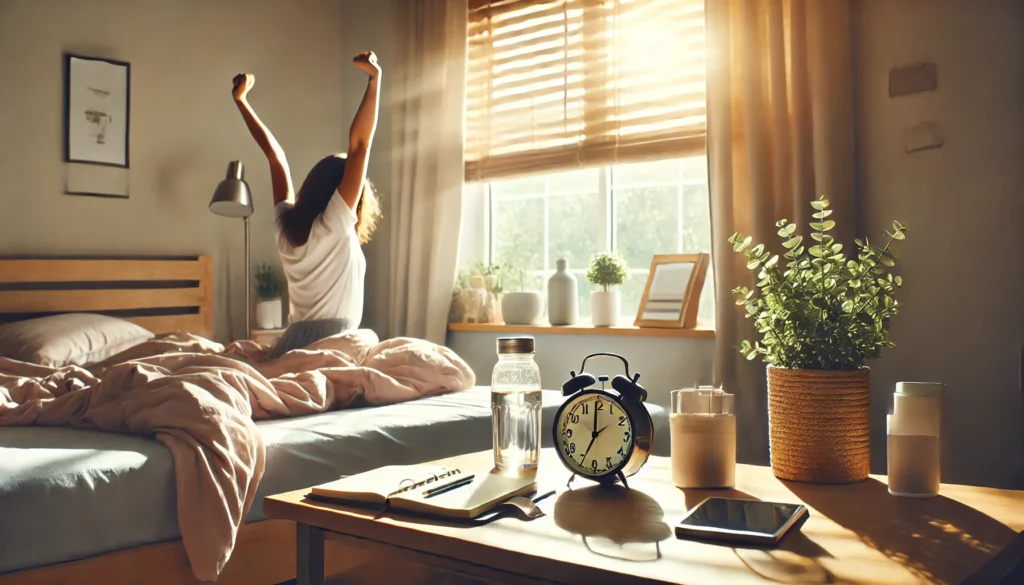Waking up early is one of the most effective habits for boosting productivity, gaining mental clarity, and carving out time for yourself before the world demands your attention. But if you’ve ever hit the snooze button more than once, struggled to get out of bed, or felt groggy all morning, you’re not alone.
The truth is, you don’t need to be a natural early riser to master the morning. With a few intentional shifts in your routine and mindset, it’s possible to wake up earlier and feel refreshed instead of exhausted.
This article explores practical, science-backed strategies to help you wake up earlier with more ease and less resistance.
Why Waking Up Earlier Makes a Difference
Mornings offer a unique window of time when distractions are fewer, your mind is clearer, and your energy is more easily directed toward what matters. Creating time early in the day gives you space to reflect, move, create, or simply prepare for a focused and intentional day.
Establishing an earlier wake-up routine can help you:
- Start the day without rushing
- Improve your overall productivity
- Reduce stress and decision fatigue
- Regulate your sleep-wake cycle for better rest quality
Now, let’s look at the strategies that make this shift easier and more sustainable.
Adjust Your Sleep Schedule Gradually
Trying to shift your wake-up time by two hours overnight will almost always backfire. Your body needs time to adapt, and making gradual changes is much more effective.
Begin by going to bed 15 to 30 minutes earlier each night and setting your alarm a little earlier in the morning. Keep this pace until you reach your target schedule. This step-by-step approach allows your internal clock to catch up, making early mornings feel more natural over time.
Follow the 90-Minute Sleep Cycle Rule
Sleep happens in cycles, and each one lasts around 90 minutes. Waking up in the middle of a deep sleep cycle often leads to grogginess and mental fog. Instead, try waking up at the end of a cycle.
Use a sleep calculator or app to determine the best time to go to bed based on when you want to wake up. Aim for total sleep times like 6 hours, 7.5 hours, or 9 hours to align your alarm with the end of a cycle.
Stop Hitting Snooze
The snooze button is tempting, but it’s not helpful. Each time you go back to sleep, your brain begins another sleep cycle that it won’t have time to finish—leaving you more tired than before.
To break the habit, place your alarm clock or phone across the room so you have to physically get out of bed to turn it off. You can also use apps that require you to solve a puzzle or scan a QR code, forcing your brain to engage and wake up fully.
Expose Yourself to Natural Light
Sunlight is one of the most powerful signals your body receives to wake up and become alert. When your eyes are exposed to natural light in the morning, melatonin production slows and cortisol levels rise—helping you feel awake and focused.
If you can, step outside for a few minutes in the morning. If that’s not possible, open your blinds or sit near a window. Light therapy lamps can also be effective if you live in a place with limited morning light.
Use the 5-Second Rule to Beat Overthinking
When your alarm rings, the longer you lie in bed, the more likely you are to convince yourself to stay there. The 5-second rule—popularized by Mel Robbins—can help break this mental loop.
As soon as your alarm goes off, count down: 5-4-3-2-1. Then get up without hesitation. This simple technique interrupts procrastination and builds the habit of taking action.
Limit Screen Time Before Bed
Screens emit blue light that interferes with melatonin production, which is the hormone responsible for making you sleepy. Using devices right before bed can delay your ability to fall asleep and lower the quality of your rest.
Try shutting off screens at least 30 to 60 minutes before going to sleep. If you must use your phone or computer, enable night mode or use blue light filtering apps. Consider replacing screen time with reading, journaling, or other relaxing activities.
Prepare the Night Before
Waking up is easier when your morning feels organized and inviting. By setting up your space and plan the night before, you remove friction that could lead to procrastination or returning to bed.
Lay out your clothes, prep your breakfast, or write a quick checklist for the next morning. Having a plan reduces decision fatigue and makes your early wake-up feel purposeful.
Give Yourself a Reason to Wake Up
If getting up early feels like a chore, your brain will naturally resist it. To make mornings more appealing, create a small reward or activity you genuinely enjoy.
This could be a cup of your favorite coffee, time to read, a walk at sunrise, or a quiet moment to yourself before the day begins. When you associate waking up early with something positive, it becomes easier to stick with it.
Keep a Consistent Wake-Up Time
Your body’s circadian rhythm thrives on consistency. Waking up at the same time every day—even on weekends—helps regulate your internal clock and makes it easier to fall asleep and wake up naturally.
Try to keep your wake-up time within 30 to 60 minutes of your usual schedule, even if you stay up later than planned. If you need extra rest, opt for a short nap instead of sleeping in.
Make Waking Up Early a Long-Term Habit
The key to success is consistency. Start with small changes, and don’t worry about being perfect. If you miss a day or sleep in, don’t abandon your progress—just get back on track the next day.
Use a habit tracker, journal your progress, and reflect on what’s working and what needs adjusting. Over time, waking up earlier will feel less like a challenge and more like a natural part of your day.
Embrace Mornings as a Tool for Growth
Waking up earlier gives you something that can’t be bought: more time. Time to create, reflect, learn, or simply be. With the right strategies, you can turn mornings into a powerful space for personal growth and productivity.
Start tonight by choosing one technique from this list. Whether it’s moving your bedtime back, setting up your environment, or just committing to getting out of bed when your alarm rings, one small change can lead to bigger shifts.
Gabriel Silva is the founder of Cursos e Soluções, a blog dedicated to personal growth, habit change, and self-discipline. Passionate about self-development and productivity, he shares practical, research-backed strategies to help people achieve their goals. He believes that small, consistent changes can lead to significant transformations over time and is committed to providing content that empowers both personal and professional success.







